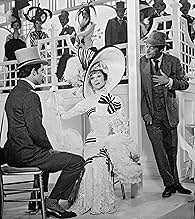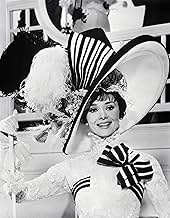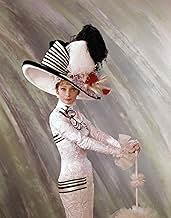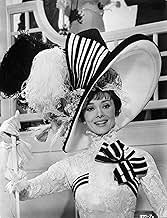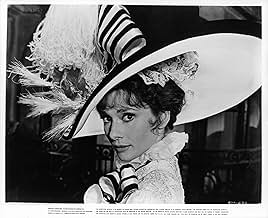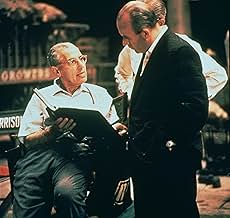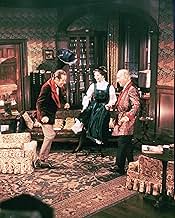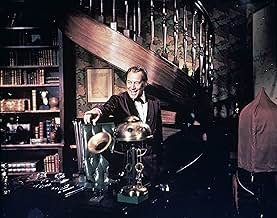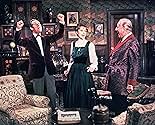En el Londres de 1910, el esnob profesor de fonética Henry Higgins acepta la apuesta de que puede hacer que la vulgar florista Eliza Doolittle esté presentable en la alta sociedad.En el Londres de 1910, el esnob profesor de fonética Henry Higgins acepta la apuesta de que puede hacer que la vulgar florista Eliza Doolittle esté presentable en la alta sociedad.En el Londres de 1910, el esnob profesor de fonética Henry Higgins acepta la apuesta de que puede hacer que la vulgar florista Eliza Doolittle esté presentable en la alta sociedad.
- Dirección
- Guión
- Reparto principal
- Ganó 8 premios Óscar
- 26 premios y 13 nominaciones en total
David Ahdar
- Ball Guest
- (sin acreditar)
- …
Elizabeth Aimers
- Cockney
- (sin acreditar)
Helen Albrecht
- Ascot Extra
- (sin acreditar)
John Alderson
- Jamie - Doolittle's crony
- (sin acreditar)
Mary Alexander
- Cockney
- (sin acreditar)
Gertrude Astor
- Cockney
- (sin acreditar)
LaWana Backer
- Ad Lib at Church
- (sin acreditar)
Walter Bacon
- Ball Guest
- (sin acreditar)
Reseñas destacadas
I've seen MY FAIR LADY several times. However, it wasn't until last night that I finally saw the 1938 version of PYGMALION and this was very interesting indeed. It seems that MY FAIR LADY is actually NOT based on the George Bernard Shaw play as much as it's based on the Leslie Howard movie. That's because the dialog (particularly Henry Higgins') is often word-for-word that of the film. Additionally, both films have the same ending--one that is NOT the same as the original play. In the play, the ending was more sad but also much more realistic and consistent with the characters and their growth (or lack thereof in the case of Henry Higgins).
Quality-wise, both films are superb and I enjoyed them immensely. One very obvious difference is that MY FAIR LADY is a musical with lovely songs, so it's a much longer movie. Another is that although Leslie Howard did a very fine job, somehow Rex Harrison came off as grouchier and more entertaining in the lead. Another major difference is that MY FAIR LADY feels more like a comedy and PYGMALION feels much more sad and deeper emotionally. Because it is a bright and colorful musical, the characters in MY FAIR LADY seem a bit less real, but with PYGMALION you are almost brought to tears late in the film.
My recommendation is that you see them both. Both are exquisitely produced and acted and you can't go wrong with either one. I could say more in my review about this film, but considering that there are already a zillion other reviews, I'll end it here.
UPDATE--Only days after posting this review, I got quite a few "not helpfuls". I assume this is from fans who adored this 1964 film. Well, my response is that it can't merit anything more than an 8 because the dialog was directly lifted from the earlier film AND so much of the singing was NOT done by the stars themselves. To me, these are flaws that prevent the film from earning a higher score. And, while I think about it, cannot justify the many 10s I see for the film.
Quality-wise, both films are superb and I enjoyed them immensely. One very obvious difference is that MY FAIR LADY is a musical with lovely songs, so it's a much longer movie. Another is that although Leslie Howard did a very fine job, somehow Rex Harrison came off as grouchier and more entertaining in the lead. Another major difference is that MY FAIR LADY feels more like a comedy and PYGMALION feels much more sad and deeper emotionally. Because it is a bright and colorful musical, the characters in MY FAIR LADY seem a bit less real, but with PYGMALION you are almost brought to tears late in the film.
My recommendation is that you see them both. Both are exquisitely produced and acted and you can't go wrong with either one. I could say more in my review about this film, but considering that there are already a zillion other reviews, I'll end it here.
UPDATE--Only days after posting this review, I got quite a few "not helpfuls". I assume this is from fans who adored this 1964 film. Well, my response is that it can't merit anything more than an 8 because the dialog was directly lifted from the earlier film AND so much of the singing was NOT done by the stars themselves. To me, these are flaws that prevent the film from earning a higher score. And, while I think about it, cannot justify the many 10s I see for the film.
I first saw this film when I was eight years old, after receiving it as a first communion present from my mother. For months I watched the movie on an almost daily basis, and it was quickly a favorite. I thought it was absolute perfection.
Now that I am a bit older.. I notice that is does have quite a few flaws. It doesn't really capture the essence of Shaw's Pygmalion, but I don't think that should really take away from the movie; they should be treated as separate entities. Some of the sets are a little, well, cramped, but consider what they had to work with, they did a pretty good job.
And then there is the dubbing issue. I recently special on MFL on AMC, and they showed "Wouldn't It Be Loverly" and "Show Me" with Audrey's voice, and though Audrey may not have the perfect melodic voice of Marni Nixon, her voice was much more "Eliza". I really do think they should have just used her voice. If you watch "Funny Face", you get a good feel for voice, which I think is beautiful in a unconventional way.
Then, there is the question of whether Julie Andrews should have played Eliza in the film version of MFL. I've gone back and forth on this issue. Now, Audrey Hepburn is my favorite actress of all time, and Julie Andrews is a close runner-up, so it really is hard to "choose". Of course Julie's voice is much better than even Marni Nixon's... but like I said before, I don't think a perfect singing voice really would suit Eliza. And as for which would play a better Eliza overall.. I really don't know. I wasn't alive to see MFL on Broadway, so I really can't compare the two. What I do know is that Audrey gave an amazing performance. Anyway, as someone else said, if Julie had played Eliza, who would have played Mary Poppins? ;)
Now that I am a bit older.. I notice that is does have quite a few flaws. It doesn't really capture the essence of Shaw's Pygmalion, but I don't think that should really take away from the movie; they should be treated as separate entities. Some of the sets are a little, well, cramped, but consider what they had to work with, they did a pretty good job.
And then there is the dubbing issue. I recently special on MFL on AMC, and they showed "Wouldn't It Be Loverly" and "Show Me" with Audrey's voice, and though Audrey may not have the perfect melodic voice of Marni Nixon, her voice was much more "Eliza". I really do think they should have just used her voice. If you watch "Funny Face", you get a good feel for voice, which I think is beautiful in a unconventional way.
Then, there is the question of whether Julie Andrews should have played Eliza in the film version of MFL. I've gone back and forth on this issue. Now, Audrey Hepburn is my favorite actress of all time, and Julie Andrews is a close runner-up, so it really is hard to "choose". Of course Julie's voice is much better than even Marni Nixon's... but like I said before, I don't think a perfect singing voice really would suit Eliza. And as for which would play a better Eliza overall.. I really don't know. I wasn't alive to see MFL on Broadway, so I really can't compare the two. What I do know is that Audrey gave an amazing performance. Anyway, as someone else said, if Julie had played Eliza, who would have played Mary Poppins? ;)
I have read in a great many places (including the IMDb) that Henry Higgins is a misogynist. It has also been said that the film is a misogynist's fairy tale. Anyone saying this has clearly not watched this film too closely.
First, Higgins is not a misogynist. A misogynist hates women. What Higgins is, in reality, is a misanthrope. A misanthrope basically dislikes and distrusts everyone! Watch the film and you'll notice that Higgins treats everyone with the same disregard-Col. Pickering, Eliza's father, his own mother-everyone receives his rather cynical disdain. Some of the minor characters come off being treated worse than the principals do. It's simply more noticeable with Eliza because it's more frequent, it's newer with Eliza because the other principal characters have known Higgins longer and thus take it in stride. The myth that Higgins is a misogynist is perpetuated by the song, "Why Can't A Woman Be More Like a Man?".
Second, it can hardly be called a misogynist's fairy tale. If that were the case, I doubt Alfred Doolittle would have cause to sing, "Get Me To the Church On Time", as he'd hardly be getting married. His life is just as "ruined" as Eliza's by his encounters with Higgins, just as altered as her life has been.
This is a great musical, a good movie and it was even better as the original play by Shaw. Well worth seeing. Recommended.
First, Higgins is not a misogynist. A misogynist hates women. What Higgins is, in reality, is a misanthrope. A misanthrope basically dislikes and distrusts everyone! Watch the film and you'll notice that Higgins treats everyone with the same disregard-Col. Pickering, Eliza's father, his own mother-everyone receives his rather cynical disdain. Some of the minor characters come off being treated worse than the principals do. It's simply more noticeable with Eliza because it's more frequent, it's newer with Eliza because the other principal characters have known Higgins longer and thus take it in stride. The myth that Higgins is a misogynist is perpetuated by the song, "Why Can't A Woman Be More Like a Man?".
Second, it can hardly be called a misogynist's fairy tale. If that were the case, I doubt Alfred Doolittle would have cause to sing, "Get Me To the Church On Time", as he'd hardly be getting married. His life is just as "ruined" as Eliza's by his encounters with Higgins, just as altered as her life has been.
This is a great musical, a good movie and it was even better as the original play by Shaw. Well worth seeing. Recommended.
My Fair Lady is a musical which is very witty. The dialogue is wonderful. The story begins as Henry Higgins (Rex Harrison) makes a bet that he can transform flower girl Eliza Dolittle (Audrey Hepburn) into a high society lady. Henry Higgins is the perfect example of high society snobbery of the times. What he wasn't counting on was falling in love with his "project". Some people may find this film to be sexist but it is really quite the opposite. While it is about a sexist person it is not actually sexist at all. In fact it is all about the irony in the relationship between that of Eliza Dolittle and Henry Higgins. It is not unbelievable that Henry and Eliza should fall in love because they are not "compatible". Opposites often attract after all. Even though there is an anti-romantic disclaimer in the original play Pygmalion , it is obvious that Eliza and Higgins are meant for one another in the end of My Fair Lady. My Fair Lady is really different from Pygmalion. There is a movie version of Pygmalion which is the dull non-musical version of My Fair Lady. Rex Harrison is simply wonderful as Henry Higgins. He is not one bit tired with his role. And even though Julie Andrews originated the role of Eliza on Broadway, Audrey Hepburn is great in the role. It would be unfair to say that she didn't deserve the role just because her voice was dubbed. The supporting cast is first rate as well. This film is more than just good, it is great. If you have not seen it yet you certainly should!
*****/ ***** stars
*****/ ***** stars
10Hitchcoc
I don't know how much I can add to this. The musical stands alone, as far as I'm concerned, so it puts a lot of pressure on the director, George Cukor, one of the greatest, to complement it. This is a lot to ask. I love this movie. I never got a chance to see the Broadway cast (I was four when it opened), but I have never been disappointed. The production numbers are grand, the byplay between the smug, offensive Higgins and Eliza is precious (my favorite song is "Just You Wait, Henry Higgins"). I've always been intrigued how Freddy never even has a chance (I can't watch those wonderful Sherlock Holmes episodes without imagining the grim visage of Jeremy Brett singing "On the Street Where You Live."). The one thing that made an impression on me, though some may see it as a criticism, is how "clean" everything is. There is no doubt in my mind that Cukor was elevating not only the dialogue but the visual images. It's probably not fair to like a movie because you like looking at an actress, but Audrey Hepburn glows in her Eliza, and I don't care if she is or was a street girl, she is the magical rose on the landscape before she ever meets Higgins. The business about who sings the songs is of no significance to me. This is a movie, not the Broadway show, so the images and sounds are melded and presented. Knowing that Audrey Hepburn has a beautiful voice makes it moot as well. I don't know if she could carry the picture or not--maybe not, but it doesn't concern me. When I first saw Stanley Holloway, there was something about him that grated on me (too many performances on the Ed Sullivan Show). He grated on me as Eliza's father. Now, every time I see this film, I thoroughly enjoy him and I really like the comedic qualities of his song. I love how he and his cronies cavort around London with total disregard for their base roots. I could go on, but I really like this film because it is filled with class: George Bernard Shaw filtered through George Cukor. Not bad!
Oscars Best Picture Winners, Ranked
Oscars Best Picture Winners, Ranked
See the complete list of Oscars Best Picture winners, ranked by IMDb ratings.
¿Sabías que...?
- CuriosidadesCostume designer Cecil Beaton created 1,500 costumes for this movie, with the exception of the pearl white gown Hepburn wears to the Embassy Ball, an original Edwardian specimen Beaton found in an antique shop.
- PifiasWhen Prof. Higgins sings "An Ordinary Man" he turns on several phonographs, seconds later he turns off one of them but all of the sounds stop.
- Citas
Professor Henry Higgins: There even are places where English completely disappears; in America they haven't used it for years.
- Créditos adicionalesIn the posters, playbills and the original cast album for the stage version of "My Fair Lady", the credits always read "based on Bernard Shaw's 'Pygmalion' ", letting the audience know what play "My Fair Lady" was actually adapted from. The movie credits simply read "from a play by Bernard Shaw".
- Versiones alternativasIn the remastered version of the film, some of the scene changes are changed from sudden cuts to wipe outs, as they probably were when the film was released. When CBS Fox released it on video originally, they were changed to sudden cuts.
- ConexionesFeatured in Toast of the Town: Episodio #18.17 (1965)
- Banda sonoraWhy Can't the English?
(1956) (uncredited)
Music by Frederick Loewe
Lyrics by Alan Jay Lerner
Performed by Rex Harrison, Wilfrid Hyde-White, and Audrey Hepburn
Selecciones populares
Inicia sesión para calificar y añadir a tu lista para recibir recomendaciones personalizadas
Detalles
- Fecha de lanzamiento
- País de origen
- Sitio oficial
- Idioma
- Títulos en diferentes países
- Mi bella dama
- Localizaciones del rodaje
- Empresa productora
- Ver más compañías en los créditos en IMDbPro
Taquilla
- Presupuesto
- 17.000.000 US$ (estimación)
- Recaudación en Estados Unidos y Canadá
- 72.560.711 US$
- Fin de semana de estreno en EE. UU. y Canadá
- 354.764 US$
- 17 feb 2019
- Recaudación en todo el mundo
- 72.685.970 US$
- Duración2 horas 50 minutos
- Color
- Mezcla de sonido
- Relación de aspecto
- 2.20 : 1
Contribuir a esta página
Sugerir un cambio o añadir el contenido que falta

Principal laguna de datos
By what name was My Fair Lady (Mi bella dama) (1964) officially released in India in Hindi?
Responde






